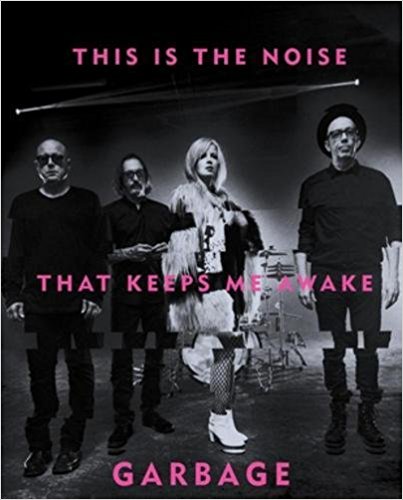Book review: This Is The Noise That Keeps Me Awake
posted by Jeff | Thursday, July 27, 2017, 1:00 PM | comments: 0
After more than 20 years, Garbage has released a book called This Is The Noise That Keeps Me Awake. It probably doesn't contain anything that hard core fans don't already know from years of interviews and articles, but it does pull everything together into a compelling narrative. On paper, I'm not sure that this is a band that even makes sense, but there's no arguing with the critical and popular reaction to the bad over the last two decades.
Where the book really shines though is in its account of the decline of the music business, which is very much intertwined with the story of how the band stopped getting along and stopped having fun. I think that too many people put the decline of the business on the transition to digital distribution, and while that's certainly a part of it, the problems are much deeper than that. The band quite correctly describes an unrealistic expectation of hit streams and interference from people who aren't really artists. Absurd spending on studio time, producers and touring certainly didn't help either.
One of the best parts for fans is the photos, and it's something you might take for granted until you realize that so much of what they had came well before digital photography was a thing. Shirley Manson has had many looks over the years, from the redheaded goth chick, to the short blonde hair (which she describes as a reaction to her personal loathing and chaos) to the pink bob. I think I realize now that the thing that has always made her attractive is not so much her look (well, to the extent that redheads are kind of my thing), but her confidence is something that comes through every time you see her, and unless you're turned off by that sort of thing, it's an incredibly attractive quality in a person. It's a recurring theme with her, that she's hyperaware of her flaws and issues, but in no way will she be apologetic about who she is.
There's a lot more from "the boys" here, too. Butch Vig has had plenty of words in the press over the years, given his A-list producer credits for some of the best albums ever made, but he spends a lot of time talking about he didn't want to be the "Nevermind guy with two other dudes and a hot chick." We also get a lot of insight into the creative dynamic of Manson, Vig, Steve Marker and Duke Erikson. Despite the discomfort of the time leading up to their hiatus, it's amazing how much they seem to really like each other, and the collaboration is intense.
We know how the story ends... they get back together at the start of this decade, and they've since created two new albums and re-issued their first. Their fan base is as devoted as ever, they have their own label, and they continue to do things on their own terms. The live comfortably doing what they love. I have a lot of respect for that. There's a wonderful story in the book about when Shirley invites Steve's daughter on stage to sing the chorus with her from "Not Your Kind of People," as she's one of the child vocals on the recorded version.
Certainly this book is for fans, but I think that anyone interested in the history of popular music or the continuing evolution of music as a business will enjoy the read. It has a lot of fun anecdotes and sidebars that include drink recipes and a full list of all tour dates ever.
Comments
No comments yet.